
The Impact of Artificial Intelligence on Talent Optimization
Artificial Intelligence (AI) has been around for years, but has recently made leaps and bounds, becoming much more accessible, more widespread, and more capable than before. There are a lot of questions around how AI is impacting the workforce, its lightning speed growth, and the fact that we now live in a world that was once science fiction. So let’s talk about how AI is impacting Talent Optimization and what organizations should be doing today to prepare for a rapidly approaching tomorrow.
Okay, but seriously, what even is AI?
Artificial Intelligence (AI) is a field of computer science that focuses on building smart machines capable of performing tasks that typically require human intelligence. AI is a machine’s ability to perform cognitive functions that we associate with human minds, such as perceiving, reasoning, learning, interacting with an environment, problem-solving, and even exercising creativity[2]. Additionally, what separates AI from human minds is that AI can only draw from pre existing sources (or their defined database) and can’t generate completely new and unique content.
You’re probably already using AI, today.
Siri, Alexa, those chatbots online that ask “what can I help you with?” – these technologies use artificial intelligence (or “machine learning”) to learn what you need, answer your questions, and solve your problems. AI is used in various industries, including marketing and sales, operations, IT/engineering, and risk and legal. AI models can generate personalized marketing, social media, and technical sales content, generate task lists for efficient execution of a specific activity, write, document, and review code, answer complex questions based on vast amounts of legal documentation, and draft and review annual reports.
Okay, and what’s ChatGPT?
ChatGPT is a tool with artificial intelligence designed to generate human-like responses to natural language questions and instructions (called “prompts”). ChatGPT is trained on massive amounts of text data and can generate coherent and contextually relevant responses to a wide range of topics including science and mathematics, technology and coding, entertainment and pop culture, and general knowledge through September 2021.
ChatGPT is able to respond to a user and complete tasks such as generating ideas, summarizing text, explaining complicated topics, writing code, translating text, summarizing research, and creating written text such as email messages, social media posts, poems, product descriptions, and blogs. There are several other similar competitors in the mix including platforms like Google’s Gemini (formerly “Bard”), Meta’s LLaMa Chat, Jasper Chat, Claude by Anthropic, and Perplexity, to name a few.
How is AI affecting Talent Optimization?
Many organizations are considering how to safely leverage AI capabilities to accelerate speed of work, automate workflows, and scale business processes. In the Talent sector, we’re seeing AI affecting:
- Recruitment and Talent Acquisition: AI can streamline the recruitment process by automating tasks such as resume screening, candidate sourcing, and pre-employment assessments. AI can help write job descriptions, scrape the internet to provide data on a candidate’s experience or their social media, review resumes, even select candidates to move forward in the hiring process.
- Candidate & Employee Relations: AI-powered chatbots and virtual assistants can interact with candidates, answer frequently asked questions, provide information about the hiring process, and collect initial screening information. For employees, AI-powered chatbots can answer common questions, offer guidance, and provide continuous learning opportunities and resources.
- Employee Onboarding and Training: AI can support the onboarding process by providing personalized training programs, virtual assistants, and interactive learning experiences. This can help employees quickly adapt to their roles and enhance their professional development.
- Creativity and Idea Generation: Generative AI tools like ChatGPT can be a virtual sounding board for ideas, provide different perspectives, and make suggestions to inspire creativity, explore concepts, and overcome writer’s block.
- People Operations & Automations: AI can automate repetitive and administrative HR tasks, such as payroll processing, benefits administration, and leave management. This reduces the administrative burden on HR professionals and allows them to focus on more strategic initiatives.
Is AI taking all our jobs?
AI brings both opportunities and potential job displacement, especially for roles that are highly repetitive or easily automated. However, it’s important to note that AI also has the potential to create new job opportunities and transform existing roles. This requires individuals to adapt, learn new skills, and be flexible in the face of changing job market dynamics.
In short, despite machine learning advancements, there is no replacement for human empathy. ChatGPT and other AI-based chatbots lack the human touch and have limitations in understanding complex issues or nuanced topics. Technology can be trained in soft skills, but it is not an apt replacement for human connection or true emotional intelligence and discernment.
Concerns with AI
There are several concerns around using AI in the workplace, including:
- Biases may be amplified: AI learns from whatever information it is being fed, which could result in unfair treatment and discrimination against certain groups of people. Employers need to follow EEOC guidelines and stay up to date on state or federal laws for equal and fair treatment of workers.
- False facts: Chat GPT and other Chatbots can “invent truth” and make false claims such as citing fake cases, incorrect authorship, and using nonexistent sources. Employers need to ensure their employees know how to fact-check and cross-reference data to determine truth vs. fiction.
- Regulation and compliance: The use of AI and ChatGPT raises complex legal and regulatory issues. One of the biggest issues is that the data for these open chatbots is not regulated. Employers should look into the EU AI Act and ensure that internal processes are following laws and regulations related to privacy, data protection, and ethical standards, as well as disclose to employees, candidates, and customers when AI is in use.
How to Pivot
This is just the beginning. While we shouldn’t fear AI, the rise of technology in the workplace is something to take seriously. If you’re not keeping up with technological demands, your organization could be left behind. Our recommendations:
- Develop your internal policies: Stay up to date on local, federal, and global regulations and how those may impact your organization and how you use technology safely. Create a policy around if, when, and how your employees may use unregulated data-sources such as ChatGPT or other chatbots. In 2023, 14% of U.S. adults said they have used ChatGPT for entertainment, to learn something, or at work.
- Skill shifting and re-skilling: With the automation of tasks, there is a growing demand for workers with skills that complement AI technologies. If AI can accomplish writing content, idea generation, and research, think about re-skilling your workforce. Instead of writing content, focus on editing content. Instead of idea generation, focus on creating prompts. Instead of research, focus on fact-checking.
- Adaptive leadership: AI-driven technologies and automation require leaders to adapt their leadership styles and practices. Leaders need to understand how to leverage AI tools, manage teams working alongside AI systems, and facilitate a smooth transition during organizational changes driven by AI implementation. In addition, leaders can buckle down on their own EQ skills – empathetic leaders are the key to maintaining a thriving workplace.
In Summary
The rapid growth of Artificial Intelligence (AI) is making a significant impact on talent optimization and the workforce. AI is changing how we handle tasks like hiring, training, and creativity in human resources. It offers opportunities to make things more efficient and improve the experience for employees. However, we need to be careful about biases and false information that can come with AI. Organizations should create rules, stay updated on regulations, and adjust leadership styles to use AI well. By using AI alongside human skills and understanding, organizations can adapt to the changing workplace and succeed.
Explore more: Top Workforce Analytics Trends to Watch
Start Your Journey to Organizational Excellence
Begin your journey with MindWire by your side. Contact us today and let’s discuss how to elevate your business together.


